Of Time and Immortality
33
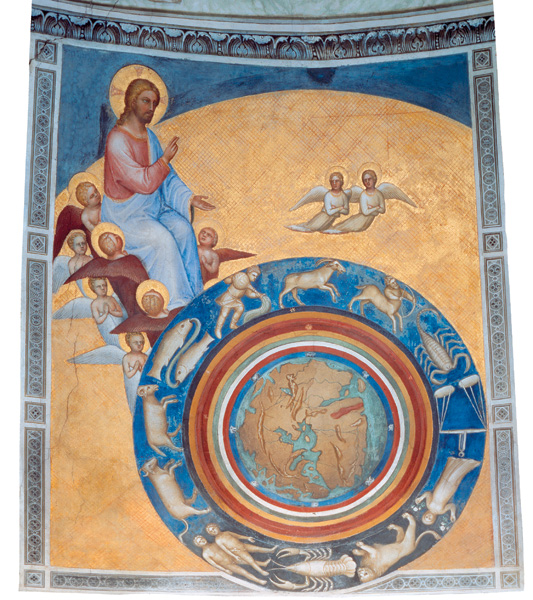
The first chapter of the first book of the Bible can be read as a treatise for measuring (or calibrating) time; the next two chapters as offering insight into the birth of death.
But let’s begin at the beginning: “In the beginning …” For centuries, that is how English readers were taught that the Bible begins, for those are the opening words of the King James Version of 1611. They are indeed a fair translation of St. Jerome’s Latin Vulgate of the fourth century and of the Greek version of the Bible we call the Septuagint (often abbreviated LXX) produced half a millennium earlier. But this famous opening line does not quite match what we find in the received Hebrew text, as given vowels and punctuations by rabbis around 1,500 years ago, and since labeled the Masoretic Text (or MT).
The King James Version’s “In the beginning God created the heaven and the earth” implies a creatio ex nihilo, God creating everything from nothing. In this locution, the verse is telling of the first act of creation. But that is not what the Hebrew text says.
34
The way the vowels are set with the consonants of the first Hebrew word in this first verse of Genesis requires that this word, b’reshit, link with and depend on the word that follows it, in this case the verbal form bara, “he created.” A literal translation would yield nothing like the customary “In the beginning God created …”; instead, it suggests an awkward English phrase, “In the beginning of He [God] created …” The New Jewish Publication Society translation offers a more elegant version of the same: “When God began to create …” What God was beginning to create is detailed in the remaining words of this verse: God was beginning to create “the heavens and the earth,” polar opposites used to denote the entire universe.
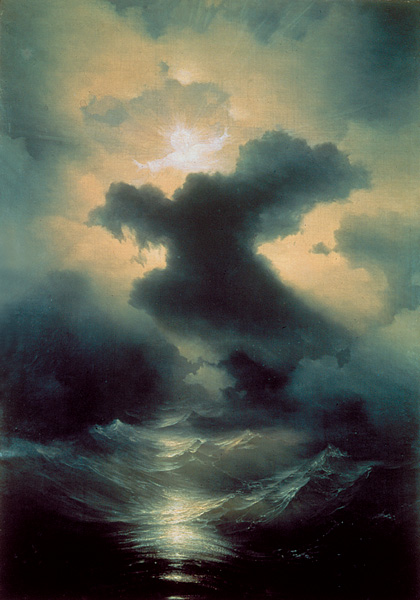
So, we are to understand the opening phrase to read, “When God began to create the universe …” Once we do so, we realize that the next two verses actually describe what existed before God decided to give them purpose and shape: There was an earth that was tohu v’vohu, which is variously translated as “a formless void” (New Revised Standard Version), “a vast waste” (New English Bible), “a formless wasteland” (New American Bible) and “a formless void” (New Jerusalem Bible). There was also darkness, water and a wind that swept over the water (Genesis 1:2). In essence, then, when God began to give shape to our universe, the four constitutive elements—earth, darkness, water and wind—already existed. But none had any function or future on its own. (Already in antiquity, it was noticed that these four elements were highly reminiscent of Greek notions regarding the four material elements, water, air, earth and fire, the last manifested primarily as the brightness in the sky, so the opposite of darkness.)
At this point, through sheer will, God actually does create something from nothing: light. By itself, however, light also has no future, until God contrasts it with the pre-existing darkness. And in the diurnal oscillation between what there was (darkness, so evening) and what has been created (light, so day), there came to be “one day,” thus a measure for time. The Hebrew is clear; we are dealing with the cardinal number “one.” (Only subsequently does the text use ordinal numbers, for the second day, the third day, etc.) The Hebrew text is therefore emphasizing that in this first creative impulse, God forged a unit for measuring time. Or, if one prefers, God initiated time.
This exposition of the first verses of Genesis 1 as inaugurating time, as well as offering a basic unit for calibrating it, sets the Hebrew creation account radically apart in goal and purpose from other Near Eastern creation narratives, in which the origin of time is beyond explanation. Moreover, Hebrew theologians, by making the history of their world begin on a unit by which time is reckoned, neatly skirted the difficult issue of how anything could exist before God. But there was another goal as well.
Among Israel’s neighbors, myths of creation were crafted first as a theogony, a narrative that explained the birth and the kinship of the gods. In making the shaping of time a cosmological feature of God’s own device, however, the Hebrews can claim that as long as God antedated any mechanism for gauging chronology—for charting what was, what is and what will come—human beings cannot effectively discuss how God came to be, let alone what was before Him. Credited with the invention of time, Israel’s God can then claim: “Before me no god was formed, nor will be after me” (Isaiah 43:10–11).
For this reason, the many parallels that are suggested between the verses of the Hebrew text and those drawn from sundry Mesopotamian (and, to a lesser extent, Egyptian) creation narratives prove to be superficial and remarkably inappropriate. For, as we shall see, with Genesis 1 the Hebrews went beyond charting the cosmos to advancing a distinctive account: that the fashioning of the entire cosmos was just preparatory for the selection of Israel as God’s favored nation. In this exposition, time and its measurement will remain a major focus in Genesis 1.
On the second day, God creates, also out of nothing, an expanse, later labeled “sky,” that splits the primordial water, thereby creating a total universe with 36water on either side of this sky, so explaining the origin of rain and of subterranean waters. On the third day, the planet Earth is made hospitable by isolating a ground that was capable of sustaining plants from the oceanic waters within which it was mingled. So far, we are dealing with a cosmogony, an explanation of how the major components of the universe were first formed.
The fourth day is crucial to a bridge from cosmogony to cosmography, a description of how the components of the universe functioned, as well as to a shift from an inanimate to an animate phase of that construction. On this fourth day, God delegates his management of time, installing the sun as pulse for the year and the moon as control for the month. Fully functioning, these orbs regulate everything that lives. Henceforth, fish and birds, created on the fifth day, and land animals and human beings, created on the sixth day, will cycle their lives according to the periodic intervals of dark and light, cold and heat, summer and winter, as generated by these celestial bodies. For human beings, moreover, these intervals will specifically establish a rhythm for agriculture and a set-time for festivals.
The Hebrew text continues to elaborate on the invention of calendric units, offering a unique explanation for the institution of the last major measure for time: the week. Having generated all that there was cosmically to be in six days, the Hebrew God is said to have selected the seventh and last day on which to celebrate the cessation of the creative process. The verbal form yishbot, “he [God] ceased” (Genesis 2:2), shares the same root with Shabbat, or Sabbath, a word that does not appear here. This notice about the seventh day was by no means an afterthought, for it had been anticipated throughout the text of Genesis 1, where crucial sentences and words had been couched in 37sevens or in multiples of seven. For example, the first verse of the chapter has seven words. The second verse has 14 words, a multiple of seven. There are many other such examples in this chapter.1
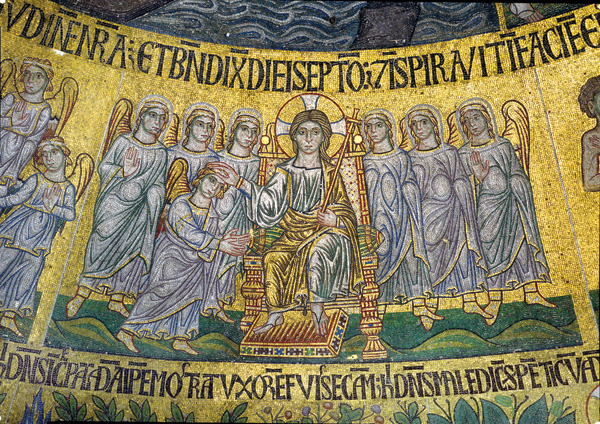
However, unlike the year, the month and the day, each of which had births in some celestial motion, the week is a very artificial construct. Like the hour and the second, the week is based on no recurring stellar or planetary interval. Not surprisingly, there is much debate on why the Hebrews had become so attached to the week that the seventh day of every week had become a special day of worship for them (or vice versa). Some commentators looked to Mesopotamia, where Israel developed many institutions during their Exile in Babylon. Some scholars focused on a Babylonian word, shab/pattum, deciding that it had been the inspiration for the Hebrew Sabbath. Eventually, this equation was discarded when it was shown that shab/pattum was nothing like the Sabbath in its function, regularity and pervasiveness. Others have argued for the existence of the week in Old Assyrian texts;2 but such a time-span was regional, limited to recording the length of debts and loans. In my view, as an institution the seven-day unit that ends on the Sabbath has remained unique to Israel.
The Hebrews themselves may not have known the real origin of the week or why they observed the Sabbath. In Scripture we find diverse explanations, embedded in the two versions of the “Ten Commandments.” The Fourth Commandment in Deuteronomy 5 urges us to “observe” the Sabbath as a periodic recall of the Exodus miracle: “You were a slave in the land of Egypt and the Lord your God freed you from there with a mighty hand and an outstretched arm; therefore the Lord your God has commanded you to observe the Sabbath day.” In Exodus 20, however, the Fourth Commandment is specifically linked to the cessation of God’s work after creation. Here, we are commanded to “remember” the Sabbath day, keeping it holy, for “In six days the Lord made heaven and earth and sea, and all that is in them, and He rested on the seventh day; therefore the Lord blessed the Sabbath day and hallowed it.”
But this is not all. The prophet Isaiah, rejecting any insinuation that God needed rest, suggests that the Sabbath was indicative of God’s sovereignty over his people: “If you refrain from trampling the Sabbath, from pursuing your affairs on my holy day … then you can seek the favor of the Lord. I will set you astride the heights of the earth, and let you enjoy the heritage of your father Jacob” (Isaiah 58:13–14).
We can now admire Genesis 1 as a meticulously constructed contribution to a theological argument. By opening the history of the world, as well as the story of Israel, with a creation that was complete within a seven-day week, a calendric unit known only among them, Hebrews could not find a more appropriate way to glory in the Sabbath as a special link between themselves and God, a rapport that is a principal theme in Hebraic historiography.3
If Genesis 1 gained authority by attributing an institution uniquely Israelite to God’s earliest creative urge, Genesis 2–3 deals with the origins of human mortality. Many generations of scholars have labeled them as two separate creation stories. This is not quite satisfactory, for whereas Genesis 1 accords well with creation narratives from the ancient world in that it details the shaping of major components in the cosmos 38(sun, moon, constellations, etc.) as well as the major elements of our planet (earth, seas, plants and animals), Genesis 2–3 hardly worries about fulfilling such a program and only incidentally talks about the shaping of crucial cosmological ingredients. Rather, what we find in Genesis 2–3 is a series of etiologies, explanations of origins, about how we came to be what, who and where we are. Most important among these is the explanation of why human beings die although they are God’s special creation.
The scene opens on a world that lacked vegetation because there was not yet rain and because humans were not yet formed to work the soil (Genesis 2:5). Although we are soon told that Lord God shapes a creature, Earthling (Adam, shaped out of earth, adamah), this negatively phrased display of conditions (there was no rain yet) charges an etiology that will not be complete until these elements are reversed, when humans are forced to work on a grudgingly yielding soil (Genesis 3:17–20). As it unfolds, another etiology is released within it, this one to explain the origin and nature of human mortality.
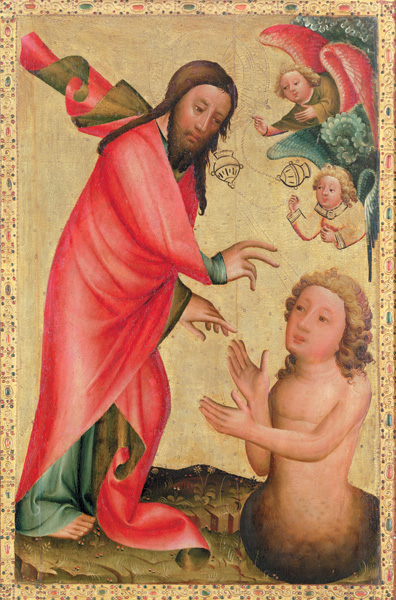
Earthling needs a mate (“a helper like him” and not “a helper for him”a—the Hebrew is ezer k’negdo [Genesis 2:18]). When Earthling does not select that mate from any of the animals the Lord God had created and paraded seriatim before him (Genesis 2:18–19), the Lord God sculpts Woman from one of the Earthling’s ribs. Why “ribs” is debated endlessly; but the idea here is that the two genders of the human beings are shaped from a single species and do not result from the joining of two separate species. This creation of Woman, we might observe, is a concession to Adam, who was wise enough not to accept a potentially ludicrous match. Note, however, that Woman is not given a name at this point; that is, she has not yet developed the functions or goals a name would imply. How this mate for the Earthling became a vessel for the continuity of humankind is told, as we shall see, in Genesis 3.
We already know (from Genesis 2:9) that the “Lord God made grow from the ground every tree that was appealing to the sight and good for eating, with the Tree of Life in the center of the garden, and the Tree of Knowledge of Good and Bad.” (As opposites, “Good and Bad” convey totality, so we may be speaking of the “Tree of Full Knowledge.”) The phrasing in the Hebrew text syntactically detaches the Tree of Life from the other trees, including the Tree of Knowledge of Good and Bad. The Tree of Life, and the Tree of Life alone, is said to stand in “the center of the garden.” This becomes crucial for deciphering what follows.
After creating the Earthling and placing him in the garden, the Lord God tells him that he may eat of any tree in the garden, except the Tree of Knowledge of Good and Bad: “As for the Tree of Knowledge of Good and Bad, you must not eat of it; for as soon as you eat of it, you shall die” (Genesis 2:17). Some well-known translations, for reasons detailed below, simply relax the clear warning in the command with such renderings for Genesis 2:17 as “the day that you eat from it, you are doomed to die.” This is too flaccid, and the Hebrew is best rendered as predicting an instantaneous death. At this point, let us keep in mind that the Earthling is forbidden to eat of the Tree of Knowledge, but not of the tree at the center of the garden, the Tree of Life.

After the Woman is created from the Earthling’s rib, the serpent attempts to beguile her: “He said to the Woman, ‘Did God really say: “You shall not eat of any tree in the garden?”’” (Genesis 3:1). We know that the prohibition was not anywhere near so broad. It is only the Tree of Knowledge of Good and Bad that was forbidden, on pain of death.
When the Woman replies to the serpent, however, she does not repeat the precise prohibition that God had spoken to the Earthling; rather she expands on it and even misquotes it. The woman replies to the serpent: “We may eat of the fruit of the other trees of the garden. It is only about fruit of the tree in the center of the garden that God said, ‘You shall not eat of it or touch it, lest you die’” (Genesis 3:2–3).
Her reply to the serpent raises several questions. We may wonder how the Woman learned about a prohibition made before her own creation. And why does she add the business about not touching? As all commentators have noted, God said nothing about touching the fruit; only eating it was forbidden. Either the Woman doesn’t know what God had commanded—or she intentionally misrepresents it. Perhaps this also explains why she says that she was forbidden to eat of the tree in the center of the garden (namely the Tree of Life) when, in fact, God had prohibited the Earthling from eating of the Tree of Knowledge of Good and Bad.
On hearing the Woman identifying the wrong tree, the serpent can reassure her, “You are not going to die, but God knows that as soon as you eat of it, your eyes 41will be opened and you will be like divine beings [that is, immortal], knowing good and bad” (Genesis 3:4–5).
Soothed, the Woman thinks about it. Without having partaken of the Tree of Knowledge of Good and Bad, she nevertheless reasons that the fruit on the tree in question could be delicious, was attractive, and (expanding, once again, on Genesis 2:9) might even increase her capacity to think. She plucks the fruit, and feeling no ill from having touched it, feels emboldened to bite in and then share it with her mate at her side. They of course do not die because, in fact, they have eaten from the tree at the “center of the garden,” the Tree of Life, and not from the forbidden Tree of Knowledge of Good and Bad. Had they eaten from the forbidden tree, none of us would be here to debate the point. That they lived demonstrates that they have broken no divine injunction. It is true that scholarship, fed on millennia of homiletics in which the fruit partaken is simply the forbidden fruit, has erroneously identified the tree from which she ate as the Tree of Knowledge of Good and Bad. Some have even suggested that the two trees were in fact one or that there was never more than one tree. But the Hebrew text is unequivocal.
The immediate consequence of their eating the fruit was not death, but the “opening of their eyes.” Realizing that they were naked, the pair made themselves 52loincloths (Genesis 3:7). We should know that nudity in the Bible does not carry the same cultural significance as it does today. In biblical as in Near Eastern lore, nudity is rarely metaphoric for sexual promiscuity and hardly conveys innocence. The prophet Isaiah certainly is not being either when he preaches naked (Isaiah 20:2–3; see also what is said about Saul in 1 Samuel 19:24). And nudity hardly ever entails guilt. More commonly, nudity attracts disrespect, as when Noah’s son Ham spies his father in his cups (Genesis 9:20–27), or when priests are warned against exposing themselves at the altar (Exodus 20:23). On occasion, nudity can indicate poverty. Being without clothing implies a lack of protection, as in the case of someone bereft of parents or a husband (Ezekiel 16:7). Nudity can also reflect a loss of control of one’s personal fate (as in the references to nudity in captivity; and possibly to Jesus on the cross). Most important for our context, however, is to observe that in antiquity animals do not wear garments; gods and human beings do.
Having survived their partaking of the fruit, the pair accepted the serpent’s counsel and deemed themselves “like divine beings who know good and bad” (Genesis 3:5). The Earthling and his Woman wanted to distance themselves from the world of animals and, by threading leaves for clothing, simply wished to approximate the divine. By doing so, therefore, their lapse was not so much disobeying God’s command but favoring the serpent’s counsel over that of God. As it happens, their first recorded answer to God proves how aware they were of crossing a fearful threshold. When God asks Earthling where he is, he lies precisely about the change that transformed him into the guilty person he has become, “I heard the sound of You in the garden, and I was afraid because I was naked, so I hid” (Genesis 3:10). The two, in fact, were no longer naked, and they knew it.
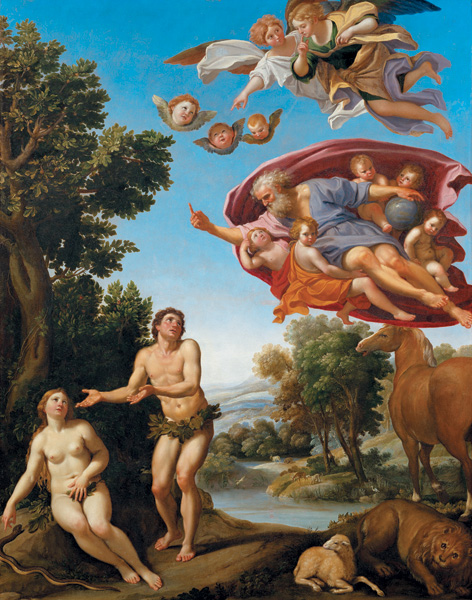
At this point, Lord God needs to confront an unacceptable situation. Having partaken from the Tree of Life, 54the Earthling and the Woman are now immortal. Moreover, the pair has proved themselves able to make choices and to reason. To have them immortal and knowing is to have them divine, a condition that Lord God could not tolerate for long. In Genesis 3:14–19, we read about Lord God’s solution. First, the serpent is cursed: “On your belly shall you crawl … and dirt shall you eat. I will put enmity between you and the Woman, and between your offspring and hers.” Rather than a curse, however, the Woman receives a gift, albeit with a sting. Desiring her husband, she is to bear their children: “I will make most severe Your pangs in childbearing; in pain shall you bear children” (Genesis 3:16). The Earthling likewise is not cursed, but the ground on which he will labor will be hostile: “By the sweat of your brow shall you get bread to eat.” He will no longer live forever, but die, his body turning into the dirt that feeds the next generation of serpents: “For dust you are, And to dust you shall return” (Genesis 3:19).
We notice the brilliant way in which the fates of all three participants in the drama are intertwined: The serpent’s brood feeds on the remains of the humans who kill it. But we also notice that even as Lord God was negating the pair’s newly acquired immortality by introducing death as a biological cessation of their lives, what they had achieved through their daring could not be fully withdrawn. Immortality undergoes transmutation and what was once attained by just two individuals because they sampled from the Tree of Life can now be shared by the whole species through birth giving, the gift Lord God has bestowed on the Woman.
Only at this point, when the promise of children guaranteed the immortality that the pair was losing individually, does the Earthling arrive at the proper name for the Woman. Thus far, she had been simply a companion to the Earthling; but now she will have a function. The Earthling had named each of the animals (Genesis 2:19–20), giving them function and purpose, and he is now ready to bestow on Woman a name that not only differentiated her gender from his, but also broadcast her unique achievement to succeeding generations: “The Earthling named his wife Eve, because she was the mother of all the living” (Genesis 3:20). The etiology that was launched when Earthling vainly sought a companion finds now its proper resolution.
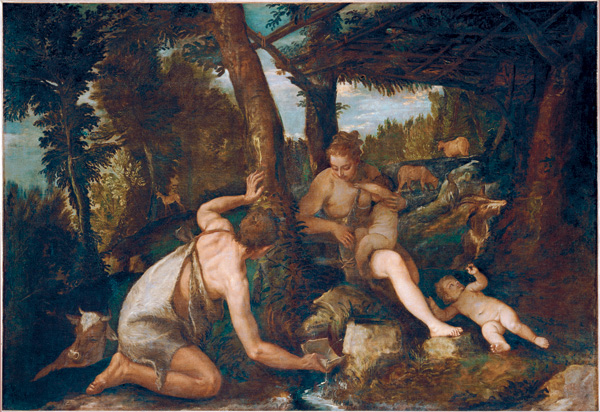
Lord God takes two additional steps. First, he clothes the pair in skins (Genesis 3:21). This is not a solicitous act on his part, not to mention that it is also unfair to the beasts. In the ancient world, ordinarily only sandals, belts, and headgears were made of leather. However, when King Sargon of Agade wished to humiliate a defeated ruler, he dressed him in skins, and when Gilgamesh, haggard and grief-stricken, lost contact with civilization, he wore skins. So as the Earthling and his wife leave the Garden, Lord God found a way to remind the pair of their proximity to the animal world they had sought to escape. The second step Lord God takes is more consequential. In Genesis 3:22, Lord God admits: “With the Earthling being like one of us in knowing good and bad, what if he should now stretch out his hand and also take from the Tree of Life and eat—he will live for-ever?”4 Prudently, Lord God blocks access to the Tree of Life (Genesis 3:24), for it must no longer be possible for the multitudes created by the pair to have individual access to immortality.
The couple’s transfiguration into our ancestors Adam and Eve is now complete. Our history can now begin.
For millennia, both in the Bible world and beyond, people have speculated about conditions that would allow mortals to grasp what was achieved momentarily by Adam and Eve. As we continue to grapple with this story, we remain beguiled by its consequence and determined to find ways to reverse our fate: theologically, by hoping for resurrection or reincarnation; scientifically, by searching for the perfect drug. The noted biologist George Wald, sympathizing with our dilemma, tried to comfort us with words that celebrated what was achieved in the Garden of Eden: “The strange thing is that we have immortality, but in the wrong place. We have it in the germ plasm [in the species]; we want it in the soma, in the body.”5 In truth, we simply cannot have it all.
For fuller expositions of ideas developed in this article, with ample bibliographic and textual citations, see Jack M. Sasson, “Time … to Begin,” in Michael Fishbane, Emanuel Tov and Weston W. Fields, eds., “Sha‘arei Talmon”: Studies in the Bible, Qumran, and the Ancient Near East Presented to Shemaryahu Talmon (Winona Lake, IN: Eisenbrauns, 1992), pp. 183-194; and Sasson, “The ‘Mother of All …’ Etiologies,” pp. 205-220, in Saul M. Olyan and Robert C. Culley, eds., “A Wise and Discerning Mind”: Essays in Honor of Burke O. Long, Brown Judaic Studies 325 (Providence, RI: Brown Judaic Studies, 2000).
The first chapter of the first book of the Bible can be read as a treatise for measuring (or calibrating) time; the next two chapters as offering insight into the birth of death.
You have already read your free article for this month. Please join the BAS Library or become an All Access member of BAS to gain full access to this article and so much more.
Already a library member? Log in here.
Institution user? Log in with your IP address or Username
Footnotes
See R. David Freedman, “Woman, a Power Equal to Man,” BAR 09:01.
Endnotes
K.R. Veenhof, “The Old Assyrian
It is in this sense (and not in its details) that Genesis 1 evokes parallels to Mesopotamia’s
The Revised Standard Version’s (RSV’s) translation of our passage, “Behold, the man has become like one of us, knowing good and evil …,” implies that Lord God is reacting to a new set of circumstances in which humans have come to know good and bad. But the verbal form in this phrase is past, not present as in the RSV, and Lord God’s apprehension does not come until the second portion of his statement, “what if he should now stretch out his hand?” The syntax of Genesis 3:22, therefore, locates Lord God’s alarm not in the pair having attained knowledge (they displayed it before they ate from the fruit), but in their potential continuing access to the Tree of Life.
